#LI BAI
Text
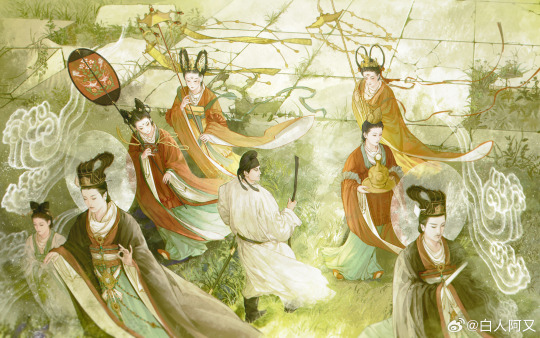
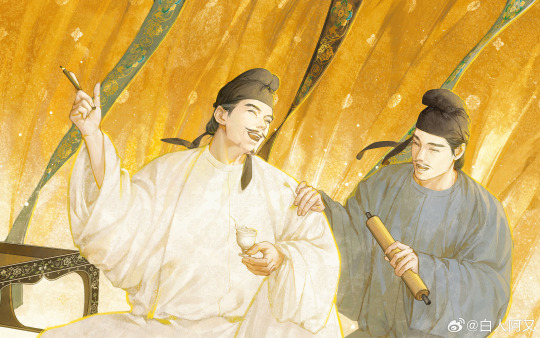

Three portraits of Li Bai, a Tang dynasty poet by 白人阿又.
188 notes
·
View notes
Text
Hi guys, I went ahead an translated one of Li Bai’s poems <3. Now, translations are an imperfect art and its hard to capture the beauty of the original text, so please forgive me for any inaccuracies that might occur! >u< *
Life it never die
Moon is my favourite guy
Wine, im wanting more
Tell An Lushan stop the war
Zoom hear the apes go whoop
By the river feel the grove
Struck by longing in the night
EVERYBODY FREE-VERSE!
115 notes
·
View notes
Text
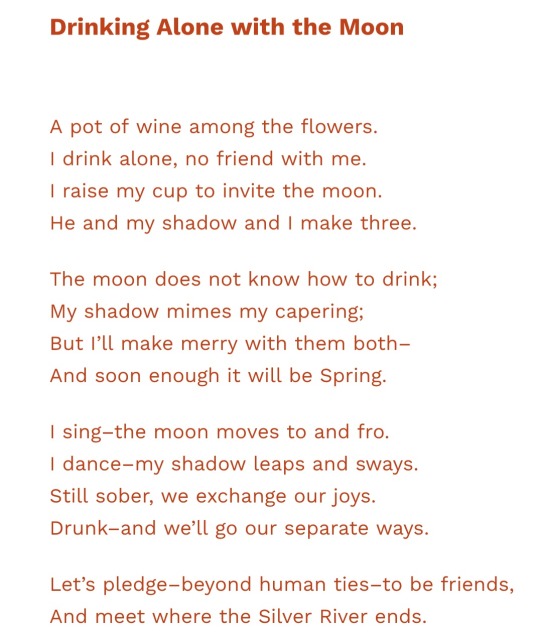
by li bai, translated by vikram seth
#so many translations of this poem but#i think this one is my favourite#poetry#the moon in her chariot of pearl#vikram seth#li bai#m
362 notes
·
View notes
Text
For the 2024 dostoyevsky-official challenge by @dostoyevsky-official:
It's 静夜思 or "Thoughts on a Quiet Night" by Tang Dinasty poet Li Bai (李白).

I already knew the poem but now I've memorized it (and practiced writing it).
Haven't decided on a poem for February yet, but I'll keep it short...
#my voice#challenge#poetry challenge#chinese poetry#li bai#李白#langblr#chinese langblr#poetry#chinese language#mandarinblr#中文
21 notes
·
View notes
Text

[Jaded in Japan] :: Li Bai
40 notes
·
View notes
Text
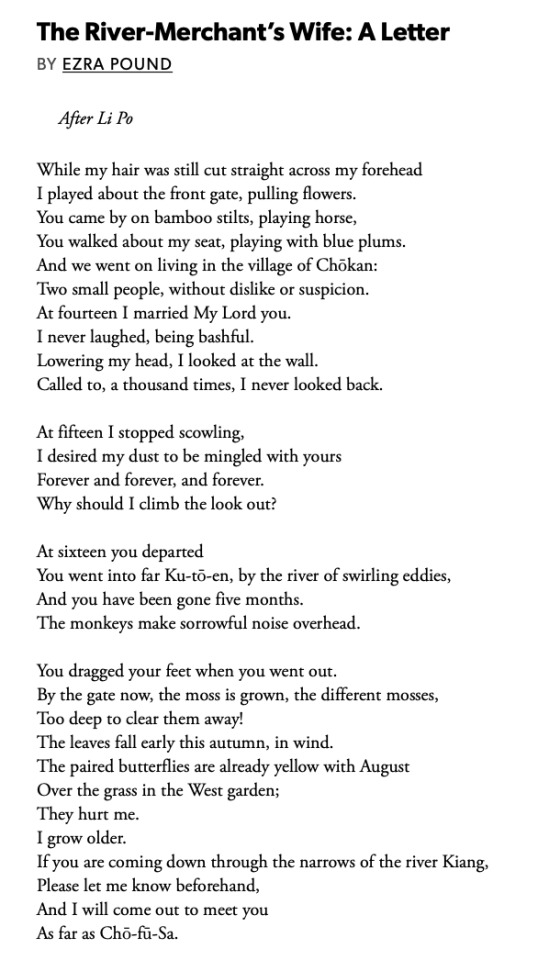
18 notes
·
View notes
Text
The Advisors Alliance Translation Post 2: “Husband, don’t cross the river. Husband, nonetheless, crossed the river.”
The Advisors Alliance 大军师司马懿之军师联盟 is a 2017 two-part Chinese TV series depicting the life of Sima Yi, a government official and military strategist who lived during the late Eastern Han Dynasty 东汉 (25 CE - 220 CE) and the Three Kingdoms Period 三国時代 (220 CE - 280 CE). [Wikipedia of the show’s first season]
The second part is titled Growling Tiger Hidden Dragon 虎啸龙吟 and keeps following Sima Yi’s life as he matures and becomes wiser [Link to the show’s second season’s MyDramaList page].
The Weibo account [Link] of the show made a series of posts in the style of small encyclopedias explaining different historical and cultural facts that where included in the series. The user @moononmyfloor compiled the 50 posts and asked me to translate them. This will be an ongoing series where I will do just that.
The posts are not in order of the episodes but I will provide the episode and season number to avoid confusion. If there are any mistakes in translation, do let me know in the comments or privately message me and I will do my best to fix them. Although I tried to stay as close as possible to the original text, I had to take some liberties in some posts to get the meaning across better. On the side, I have included extra information from personal research that explains certain things better.
If it is difficult to read the letters, tap or click on the image to expand it. Without more preamble, here you go.


Extra information:
Yuefu (乐府), literally Music Bureau, are a genre of ancient Chinese folk songs that, either imitate the style of, or are from the Imperial Music Bureau. The latter was an institution in charge of collecting and writing lyrics to folk songs. Yuefu are known for having strict syllabic rules that change from dynasty to dynasty.
《公无渡河》 is also known as Kong Hou Yin (箜篌引). Konghou is an ancient Chinese stringed instrument similar to a harp. A Yin (引), in this context, is another type of ancient music poetry that has a freer syllabic structure and is characterized by long syllables that go well with the melody of the konghou. Below is a picture of the instrument:
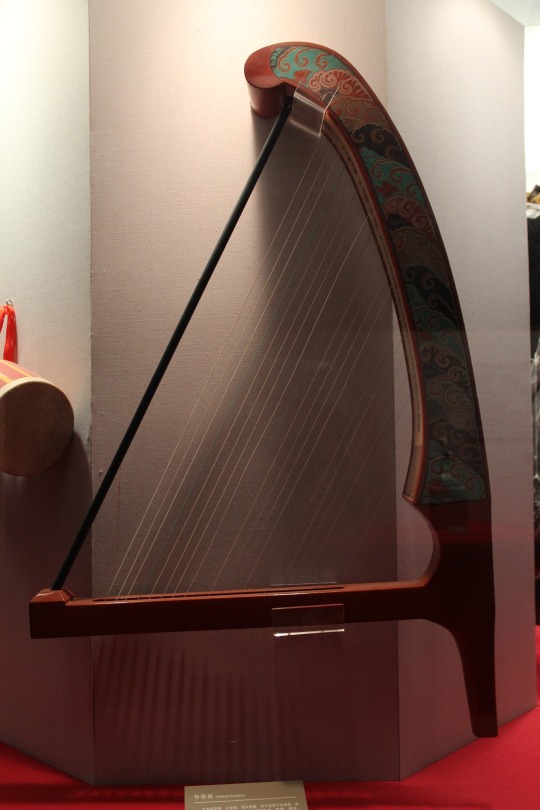
Vertical konghou 箜篌 in exhibit at the Gansu Provincial Museum, Lanzhou, China. Taken on May 10, 2013 by Gary Todd [image source].
Allow me to clarify something. The folk song 《公无渡河》 was recorded by Cui Bao in "Notes on Ancient and Modern Times" to be of Gojoseon origin. As such, Koreans consider it to be their oldest surviving folk song.
The Chinese consider it a Chinese Han Dynasty song on account of the tale being set and song created in the Lelang Commandery [108 B.C.E. - 313 C.E.] which is one of the four regions Gojoseon was split into while under Han rule. Koreans consider the residents of Lelang, and the other commandaries, to be Gojosen Koreans who retained a separate culture to the Han Chinese. If you wish to conduct further research into the song, don’t get surprised if you read different names for the characters that appear in the story.
Koreans call the song "Gongmudohaga (공무도하가)” and the ferryman Gwaklijago (곽리자고). The Korean folk tale differs from the Chinese retelling in that the Korean name of Gwaklijago wife, who is credited with creating the actual song, according to certain Chinese and Korean retellings, is Yeo-ok (여옥) rather than Li Yu (丽玉). In Cao Yong and Cui Bao’s retellings, the wife of the drowned drunk man created the song while, in the Korean version, it was the wife of the ferryman who, upon learning about what had transpired from her husband once he came home, created the song on her harp, called in Korean gonghu (공후).
Many Chinese poets have retold the story in their own ways and added, omitted, or reinterpreted content. Some of said poets are Li Bai and Chen Shou of Shu Han. On top is Li Bai's version which lacks strict syllabic structure, a signature of his style and, on the bottom, Chen Shou's more structured one:

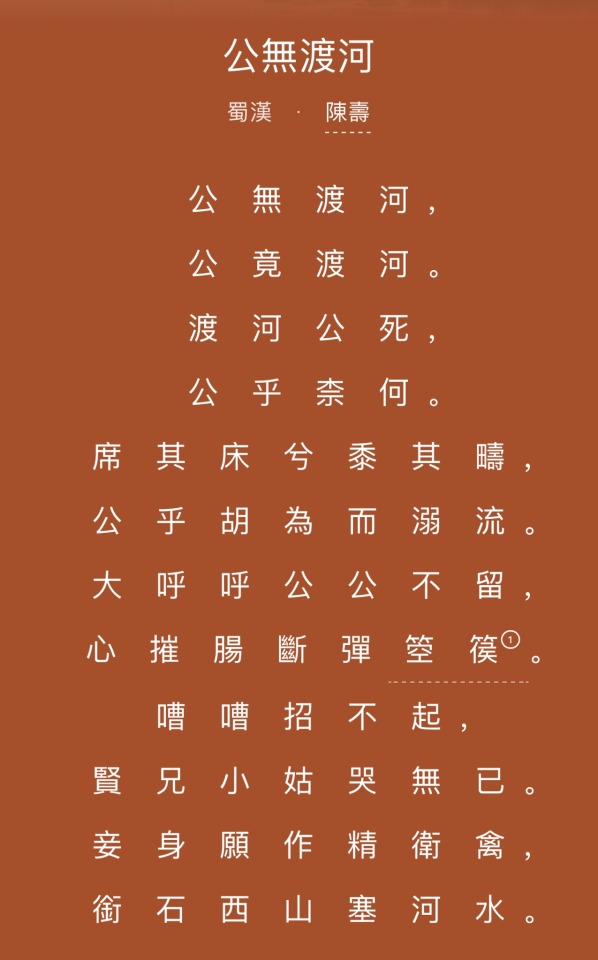

This expression 《公无渡河, 公竟渡河》 is often used as an allegory to satirize someone who is heading into clear danger but is too stubborn or obsessed to listen. If this person doesn't listen, then they are sure to run into trouble.
Catalogue (find the rest of the posts):
#chinese culture#chinese history#the advisors alliance#sima yi#history#three kingdoms#eastern han dynasty#korean folklore#li bai#chinese poetry#ancient chinese poetry#ancient china#gojoseon#korea
86 notes
·
View notes
Text
RIP Li Bai you would've loved tiktok
11 notes
·
View notes
Text
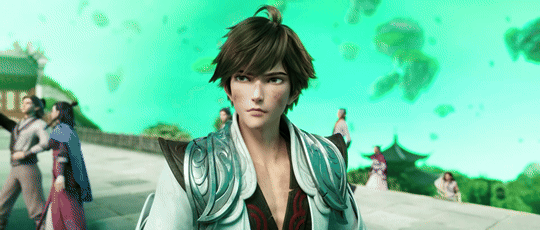
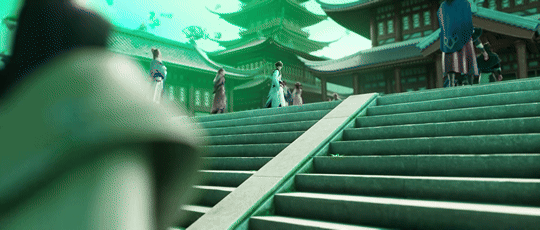
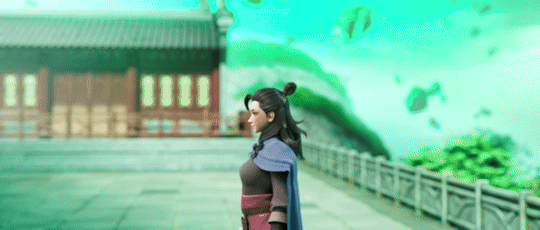

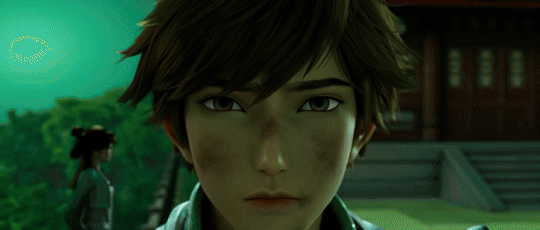
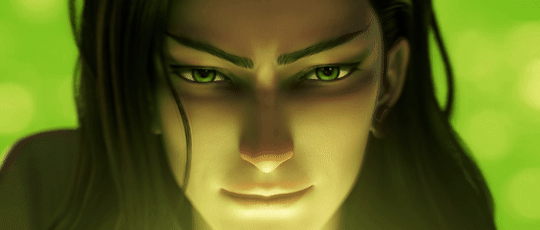
Honor of Kings: Chapter of Glory (Wangzhe Rongyao: Rongyao Zhi Zhang) - Episode 03
#animationedit#donghuaedit#fyanimegifs#animangaboys#honor of kings#honor of kings chapter of glory#dailyanimatedgifs#animeedit#rongyao zhi zhang#honor of kings li bai broken moon#li bai#wangzhe rongyao#flashing#eyestrain#anisource#2700lagostas#2700gifs
9 notes
·
View notes
Text


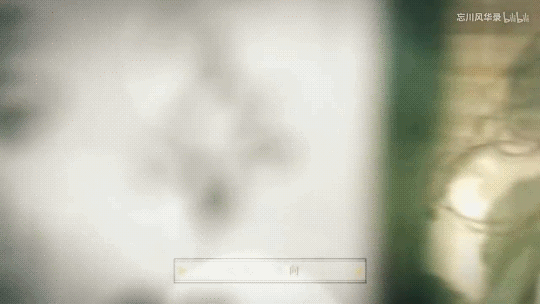
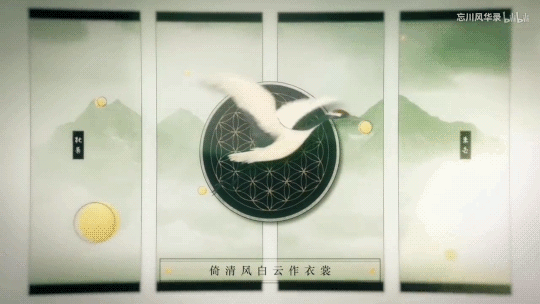



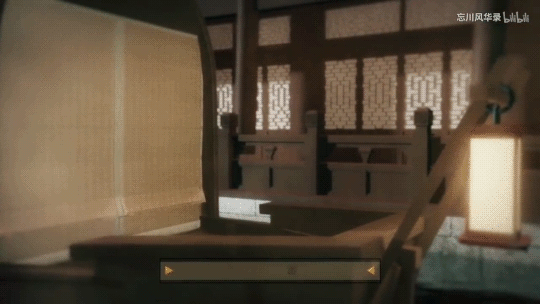

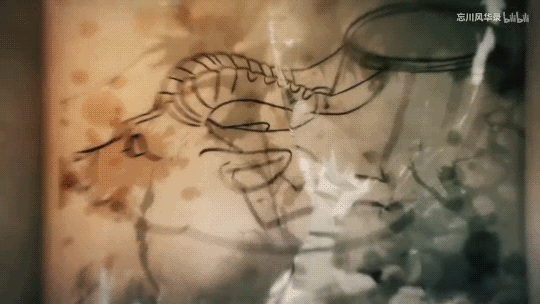
❝Breaking off a branch, I remember the scent of peonies from yesteryear.❞
࿐ྂ
洛阳怀 / 【忘川风华录】
Wangchuan gifset — 2/?
#忘川风华录#Wang chuan feng hua lu#wcfhl#luo tianyi#vocaloid#chinese vocaloid#chinese music#gufeng#gifset#gifs#moving gifs#li bai#du fu#lidu#gufeng music#洛阳怀#Luo yang huai#I forgot that I hate to be interstate for a week which means no keyboard and no writing#so ill just make gifs in the meantime#mine
7 notes
·
View notes
Text
VII. Wish You Were Here
The weather is beautiful.
It rained every day.
I lay on the beach,
High mountains how I long for you,
Drinking piña coladas on the sand.
Sipping cold water beneath the trees.
I wish you were here.
I’ve never been so in love with aloneness.
With credit to Li Bai for his absolutely killer line, 高山安可仰, in “Message to Meng Haoran.”
Prompt: Write a poem titled “Wish You Were Here” that takes its inspiration from the idea of a postcard.
4 notes
·
View notes
Text
A poem by Li Po translated by Vikram Seth

Drinking Alone with the Moon
A pot of wine among the flowers.
I drink alone, no friend with me.
I raise my cup to invite the moon.
He and my shadow and I make three.
The moon does not know how to drink;
My shadow mimes my capering;
But I’ll make merry with them both–
And soon enough it will be Spring.
I sing–the moon moves to and fro.
I dance–my shadow leaps and sways.
Still sober, we exchange our joys.
Drunk–and we’ll go our separate ways.
Let’s pledge–beyond human ties–to be friends,
And meet where the Silver River ends.

Translated by Vikram Seth
Original Chinese by 李 白 (Li Po) (701-762)
月下獨酌
花間一壺酒,
獨酌無相親;
舉杯邀明月,
對影成三人。
月既不解飲,
影徒隨我身;
暫伴月將影,
行樂須及春。
我歌月徘徊,
我舞影零亂;
醒時同交歡,
醉後各分散。
永結無情遊,
相期邈雲漢。
25 notes
·
View notes
Text
li bai only writes about 2 things huh
1. alcohol
2. the moon
14 notes
·
View notes
Text
answer based on personal preference! in the tags please tell me why, and also if you've read their work in the original or in translation :)
#li bai#du fu#李白#杜甫#唐诗#chinese poetry#chinese literature#my polls#tang poetry#conducting a little study!#the stereotype is that du fu is objectively better but everyone secretly prefers li bai so i'm curious to see how true that is#not saying which one i prefer for now. keeping my cards close to my chest 👀
11 notes
·
View notes
Text
Bivacco notturno al monastero sui monti
Allungo la mano, afferro le costellazioni
Non oso parlare ad alta voce
Ho paura di svegliare chi sta sopra il cielo.
- Li Bai
17 notes
·
View notes
Photo
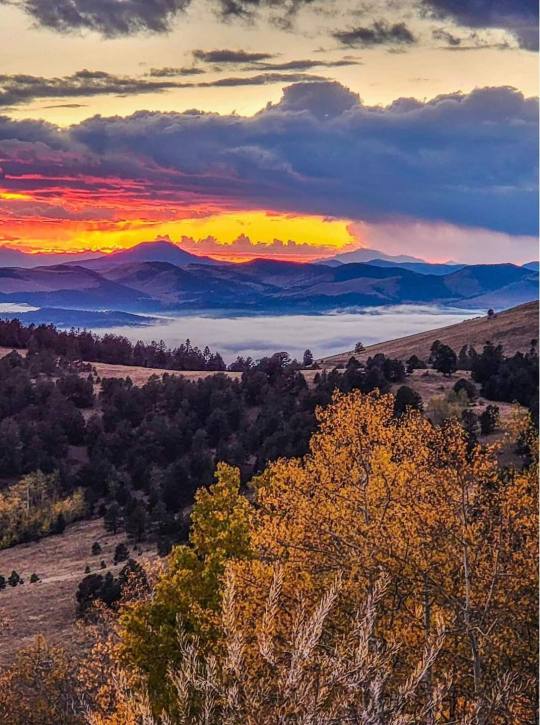
Taken from the cemetery in Cripple Creek, west of Colorado Springs, CO. Mt. Pisgah is on the right. Photo: Michael Olson (2022) :: [Scott Horton]
* * * *
“The birds have vanished into deep skies. A last cloud drifts away, all idleness. Inexhaustible, this mountain and I gaze at each other, it alone remaining.”
— Li Bai, from Reverence-Pavilion Mountain, Sitting Alone; Mountain Home: The Wilderness Poetry of Ancient China (tr. by David Hinton)
#Mt Pisgah#Michael Olson#Scott Horton#Colorado Springs#Cripple Creek#poem#poetry#Li Bai#Reverence Pavillion Mountain
95 notes
·
View notes